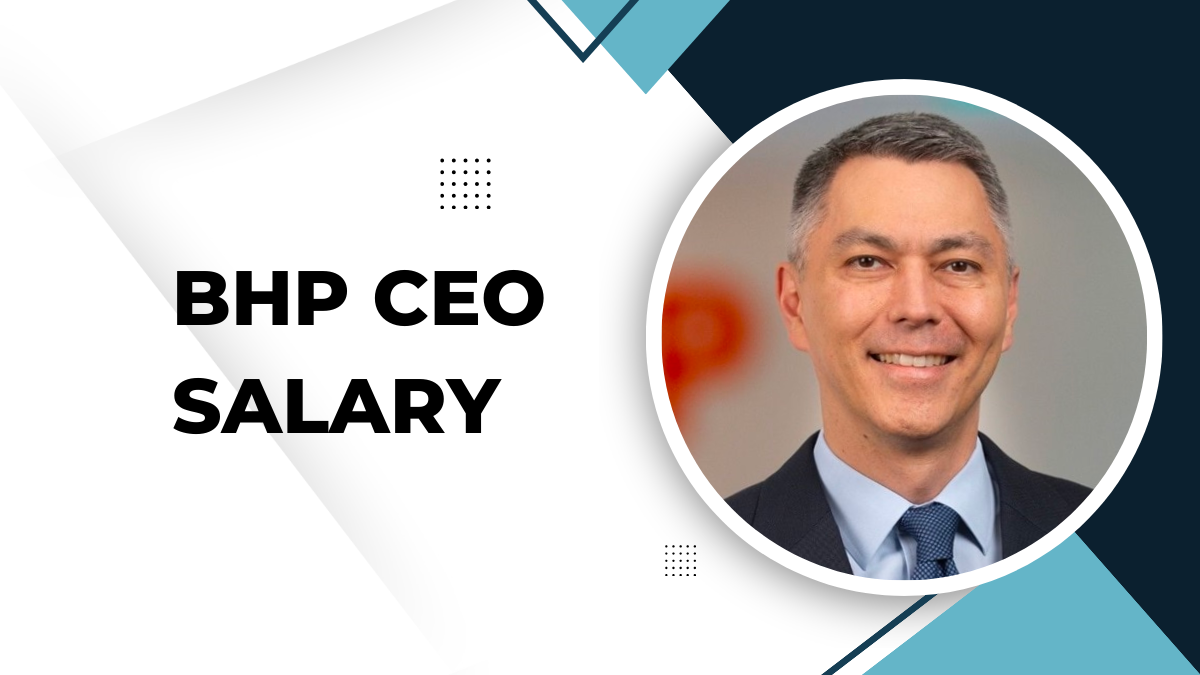BHP CEO Salary: Unveiling the Compensation Package
Brace yourself because today, we are delving into the world of eye-popping compensation packages with a focus on none other than the BHP CEO salary. Get ready to have your mind blown as we unveil the staggering figures behind this executive’s paycheck.
From luxurious perks to mind-boggling bonuses, join us on this journey through high finance and sky-high salaries that will leave you both intrigued and astonished!
Breakdown of BHP CEO’s salary and benefits
The compensation package of the BHP CEO is a highly discussed topic, with many people curious about how much the company’s top executive earns. In this section, we will provide a breakdown of the salary and benefits that make up the total compensation package for BHP’s CEO.
- Base Salary: The base salary is the fixed amount that the CEO receives annually as per their employment contract. For BHP CEO Mike Henry, his base salary for FY2020 was $1.7 million USD, which was an increase of 2% from the previous year.
- Short-Term Incentive (STI) Bonus: In addition to the base salary, CEOs often receive bonuses based on performance targets set by the board of directors. At BHP, this bonus is known as STI and is paid out in cash or deferred shares depending on company performance against predetermined goals. For FY2020, Mike Henry received an STI bonus of $3 million USD.
- Long-Term Incentive (LTI): Apart from annual bonuses, CEOs also receive long-term incentives in the form of stock options or equity-based awards to align their interests with shareholders and motivate them to drive long-term growth for the company. At BHP, LTI grants are based on three-year performance periods and include both cash-based awards and deferred equity awards. For FY2020, Mike Henry received an LTI grant worth USD 6 million.
Comparison with other top CEOs in the industry
When it comes to the salary and compensation package of BHP CEO Mike Henry, it’s natural to compare it with those of other top CEOs in the industry. After all, BHP is one of the largest mining companies in the world and a significant player in the global market. So, how does Mike Henry’s compensation stack up against other top CEOs in similar positions?
Firstly, let’s take a look at some key statistics. According to Forbes’ 2021 list of highest-paid CEOs, Mike Henry ranks at number 84 with a total compensation package of $12.9 million for fiscal year 2020. This puts him behind other top mining CEOs such as Rio Tinto’s Jean-Sébastien Jacques (ranked at number 16 with a total compensation of $17 million) and Anglo American’s Mark Cutifani (ranked at number 21 with a total payment of $15.6 million).
However, it’s important to note that these figures only reflect base salaries and bonuses, not including other forms of long-term incentives such as stock options or pension plans. When taking these into account, Mike Henry’s overall compensation may be higher than his counterparts.
Furthermore, comparing CEO salaries across different industries can be tricky due to varying factors such as company size, performance metrics, and economic conditions. For example, while BHP may be more giant than Rio Tinto or Anglo-American in terms of revenue and market capitalization, its financial results may not necessarily be better or worse.
Analysis of controversies surrounding BHP CEO’s compensation
The compensation package of BHP CEO Andrew Mackenzie has been a topic of discussion and debate in recent years. As one of the largest mining companies in the world with a significant global presence, BHP’s CEO compensation is closely scrutinized by investors, stakeholders, and the general public.
One of the main controversies surrounding Mackenzie’s compensation is its sheer size. In 2019, his total remuneration was reported to be around USD 18 million, making him one of the highest-paid CEOs in Australia. This amount includes his base salary, short-term incentives, long-term incentives, and pension contributions. Many critics argue that this level of compensation is excessive and disproportionate to the company’s performance.
Another aspect that has raised eyebrows is the use of performance-based bonuses as a significant part of Mackenzie’s pay package. While this may seem like an appropriate way to incentivize top executives to drive company growth and success, there have been accusations that these bonuses are too easy to achieve. Some reports suggest that executives only need to meet minimum performance targets to receive large bonuses, leading to questions about whether they are indeed tied to exceptional performance.
Additionally, there have been concerns raised about discrepancies between executive pay increases versus those given to employees at lower levels within the company. In 2019 alone, while Mackenzie’s total remuneration increased by 2%, employee salaries saw only a modest increase of 1%. This has led many employees and unions to criticize BHP for not distributing profits.
Impact on company performance and shareholder opinions
The salary of a CEO is often a topic of debate and scrutiny, not only for employees and consumers but also for shareholders. This is because the compensation package of a CEO can have a significant impact on company performance and shareholder opinions.
Firstly, it is essential to understand how the CEO’s salary affects company performance. In most cases, the CEO plays a crucial role in setting the strategic direction of the company and making essential decisions that can ultimately determine its success or failure. As such, their compensation package should align with the performance goals of the company. A well-structured compensation package can serve as an incentive for CEOs to drive growth, increase profits, and improve overall company performance.
On the other hand, an overly generous compensation package can create negative consequences for both the company and its shareholders. If a CEO is receiving a high salary regardless of their performance, it may lead to complacency and lack of motivation to work towards achieving business goals. This could result in poor decision-making and ultimately harm the financial health of the company.
Moreover, excessive CEO salaries can also negatively affect shareholder opinions. Shareholders invest in companies with expectations of good returns on their investments. When they see that a large portion of their investment is being used to pay exorbitant salaries instead of being reinvested into growing the business, it can lead to dissatisfaction among shareholders. This could potentially cause them to lose confidence in the leadership and management abilities of the CEO.
Future considerations for BHP CEO’s salary
The compensation package of BHP CEO has been a topic of discussion and debate for many years. While the current CEO’s salary is well-deserved, it is essential to consider future considerations for the next BHP CEO’s compensation.
Firstly, it is essential to evaluate the overall performance of the company when determining the CEO’s salary. The CEO’s salary should be based on the company’s financial success, market share, and growth under their leadership. It should also take into account any significant challenges or obstacles faced by the company during its tenure.
Another factor that needs to be considered is industry standards and practices. As one of the leading global mining companies, BHP must remain competitive in attracting top talent for its leadership positions. This means offering a competitive compensation package that aligns with industry standards and attracts highly skilled individuals who can drive the company forward.
Moreover, there needs to be a balance between short-term incentives and long-term incentives in the CEO’s compensation package. While short-term incentives such as bonuses are essential for driving immediate results, long-term incentives such as stock options ensure that CEOs are motivated to create sustainable growth for the company in the long run.
Additionally, there has been an increasing emphasis on environmental sustainability and social responsibility among companies in recent years. This trend is expected to continue in the future, making it crucial for BHP to include ESG (environmental, social, governance) metrics in its executive compensation packages. These metrics could include targets related to reducing carbon emissions and promoting diversity.







